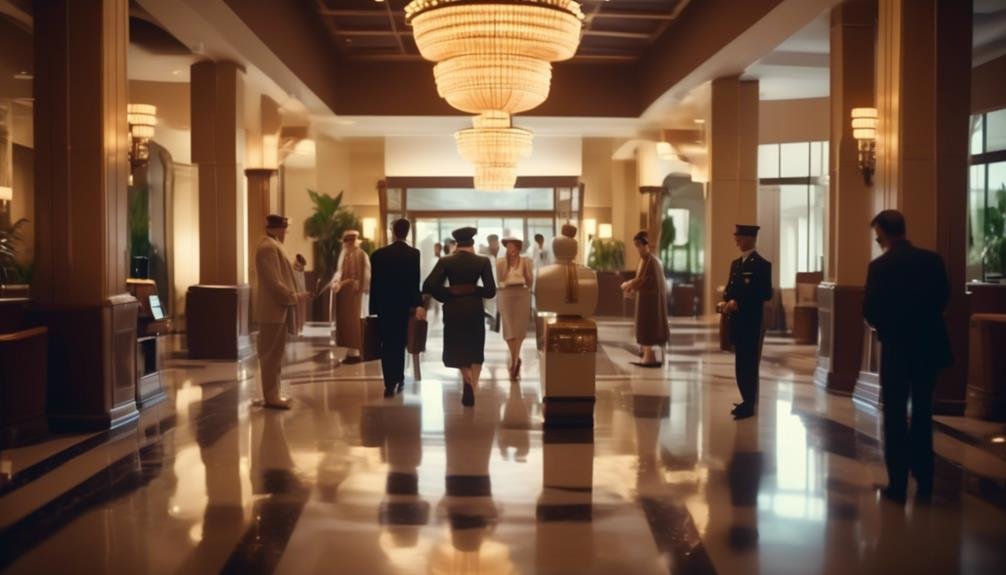Hospitality Management: Balancing Tradition and Innovation
In the rapidly evolving landscape of hospitality management, the delicate balancing act between tradition and innovation has become more crucial than ever. The intricate dance between honoring time-honored practices and embracing cutting-edge technologies is essential for staying relevant in today's competitive industry.
As you navigate this complex terrain, you'll discover the pivotal role that tradition plays in shaping the guest experience, while also harnessing the power of innovation to elevate your operations to new heights.
But how exactly can you strike this balance without compromising the authenticity of your establishment? Stay tuned to uncover the strategies and insights that will guide you through this compelling journey of harmonizing tradition and innovation in hospitality management.
Key Takeaways
- Cultural preservation shapes the identity of a hospitality establishment.
- Incorporating traditional elements creates authenticity and nostalgia.
- Technological advancements enhance the guest experience.
- Balancing tradition and innovation ensures the longevity and adaptability of a hospitality business.
The Role of Tradition in Hospitality Management
How can tradition be harnessed to enhance the innovative strategies of hospitality management, ensuring a balance that resonates with both heritage and contemporary demands? Cultural preservation plays a pivotal role in shaping the identity of a hospitality establishment. By incorporating traditional elements into the guest experience, such as local art, cuisine, or rituals, you can create a sense of authenticity and nostalgia that resonates with customers on a deep emotional level. This not only fosters a connection to the local culture but also enhances customer satisfaction by providing a unique and memorable experience.
Incorporating tradition into hospitality management doesn't mean being stuck in the past. Instead, it involves strategically leveraging heritage to elevate the overall guest experience. For example, a hotel could offer cooking classes led by local chefs, preserving traditional recipes while providing a hands-on, interactive experience for guests. This approach not only contributes to cultural preservation but also adds a layer of innovation to the traditional culinary experience, catering to the modern traveler's desire for authentic and immersive activities.
Embracing Innovation for Competitive Advantage
To gain a competitive advantage in hospitality management, embracing innovation is essential for staying ahead of the curve and meeting the evolving needs of guests. In today's dynamic industry, innovative marketing strategies and technological advancements play a crucial role in attracting and retaining guests. By leveraging these tools, you can create unique experiences, streamline operations, and differentiate your establishment from competitors.
| Innovative Marketing | Technological Advancements | Benefits |
|---|---|---|
| Personalized campaigns | Advanced guest apps | Targeted guest engagement |
| Influencer partnerships | AI-driven chatbots | Enhanced guest experience |
| Virtual reality tours | Integrated PMS systems | Streamlined operations |
Innovative marketing techniques, such as personalized campaigns and influencer partnerships, allow you to connect with your target audience on a deeper level, driving engagement and loyalty. Meanwhile, embracing technological advancements, like advanced guest apps and AI-driven chatbots, can significantly enhance the overall guest experience, from booking to check-out. Implementing virtual reality tours and integrated property management systems (PMS) not only streamlines operations but also demonstrates your commitment to embracing cutting-edge solutions. By incorporating these innovations, you can gain a competitive edge in the hospitality industry and ensure long-term success.
Integrating Tradition and Innovation in Guest Experiences

Leveraging both time-honored traditions and cutting-edge innovations, you can craft guest experiences that seamlessly blend the richness of heritage with the excitement of modernity. Achieving this integration involves balancing cultural authenticity with technological advancements, and personalized service with cutting-edge amenities.
To achieve cultural authenticity, consider offering experiences that showcase local traditions, cuisine, and arts, providing guests with an immersive and genuine taste of the destination's heritage. Simultaneously, integrating technological advancements such as smart room features, mobile check-ins, and personalized recommendations based on guest preferences can elevate the overall guest experience, adding a touch of modern convenience and sophistication.
Moreover, the synergy of personalized service and cutting-edge amenities can set the stage for unparalleled guest experiences. By combining attentive, personalized service with state-of-the-art amenities like virtual reality concierge services or interactive in-room technology, you can create an environment where guests feel both valued and captivated by the innovative offerings.
This strategic integration not only appeals to guests seeking a balance between tradition and innovation but also positions your establishment as a pioneer in the evolving landscape of hospitality experiences.
Balancing Operational Practices With Modern Technologies
Balancing operational practices with modern technologies requires a strategic approach that seamlessly integrates time-honored traditions and cutting-edge innovations, ensuring a harmonious coexistence that enhances the overall guest experience. In the dynamic hospitality industry, achieving operational efficiency while embracing technological advancements is essential for staying competitive and meeting the evolving needs of guests.
Here are key strategies to achieve this balance:
- Implementing automated check-in/out systems to streamline guest processes and reduce wait times.
- Leveraging data analytics to gain insights into guest preferences and behavior, allowing for personalized service and targeted marketing.
- Integrating smart room technology for energy management, personalized comfort settings, and interactive guest experiences.
- Adopting mobile apps for seamless communication between staff and guests, enabling requests to be fulfilled promptly and enhancing overall satisfaction.
Overcoming Challenges in Implementing Traditional and Innovative Strategies

When implementing traditional and innovative strategies in hospitality management, you can anticipate encountering various challenges that demand creative solutions and a forward-thinking approach. Traditional and innovative marketing strategies often clash, requiring a delicate balance to ensure both are effectively implemented. Traditional methods may include word-of-mouth marketing or print advertisements, while innovative strategies encompass digital marketing and social media campaigns. Finding the equilibrium between these approaches is crucial for a comprehensive marketing plan.
Adapting cultural practices for modern guests presents another hurdle. While preserving tradition is important, it's equally vital to cater to the evolving needs and expectations of contemporary clientele. This might involve revamping traditional dishes to meet modern dietary preferences or updating cultural events to align with current trends. Striking a balance between preserving heritage and meeting the demands of today's diverse customer base is an ongoing challenge.
Navigating these obstacles requires a strategic mindset, where you must blend the time-honored with the avant-garde. Embracing the challenges and seeking innovative solutions will allow you to develop a harmonious fusion of tradition and modernity, ultimately enhancing the guest experience and driving business success.
Conclusion
In the dynamic world of hospitality management, balancing tradition and innovation is vital for staying ahead. By integrating the timeless charm of tradition with the cutting-edge power of innovation, you can create guest experiences that are truly unforgettable.
Embracing this balance won't only enhance your competitive advantage, but also ensure your operational practices are optimized with modern technologies.
Overcoming challenges in implementing these strategies will lead to a successful and sustainable future in the industry.







